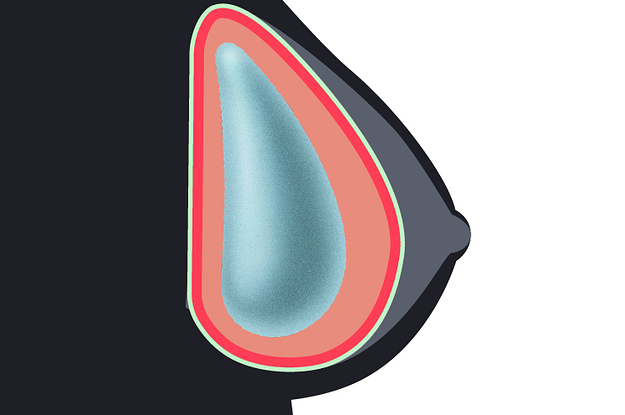
Breast implants carry inherent risks that increase the longer you have them, boosting the likelihood that you need to replace or remove the devices at some point.
It’s generally recommended that people replace their breast implants every 10 years, but that can change depending on any problems that may occur with your implants. Otherwise, MRI screenings are recommended five to six years after your surgery and then every two to three years thereafter. (Some insurance companies will not cover implant removal or replacement, despite complications.)
“It's not just a one-step procedure and then you don't ever have to see a plastic surgeon again,” Cate said. “It’s not like getting a haircut. You might have to go back to the operating room more than once, which is a serious consideration.”
Cancer aside, some other complications are bleeding, rippling, unexpected scarring, and changes in how your nipples or breasts feel, including pain or numbness. There are other potentially more serious issues that may require additional surgery to repair, including infection, ruptures or leaks, displacement, and capsular contracture (a painful hardening of the breast around the implant).
Generally, however, “these are really safe devices and most patients have a good experience,” Broyles said. There’s little data on how transgender patients fare with their breast implants, but early research shows that complications are rare and occur at the same rates as in cisgender patients.
Ruptures, for example, tend to occur anywhere between six to eight years after implantation. They can be caused by compression during a mammogram, normal aging of the implant, or — most commonly — damage done by surgical tools during the implant surgery.
Ruptures may not be obvious depending on the type of implant you have. Two types of breast implants are approved for use in the US: saline- and silicone-filled. (The latter are more popular because they tend to look and feel more natural, especially among reconstructive surgery patients who no longer have breast tissue to lay on top of the implants, Broyles said. Complications involving silicone breast implants first emerged in the 1960s. Safety concerns led the FDA to issue a “moratorium” or ban on the implants from 1992 to 2000, which officially ended in 2006 following receipt of safety and risk data on the devices.)
Patients with saline-filled implants know right away when their devices rupture, because it’s like a balloon of salt water that immediately deflates, but when silicone gel leaks out of an implant, it tends to stay in place without causing any breast shape change, Broyles said.
“That's why the FDA and plastic surgeons recommend monitoring with imaging to ensure that a rupture hasn't occurred,” Broyles said. “If you know you have a leak or rupture, I would definitely recommend replacing it or removing it.”
Another potential complication faced by some people who get some types of breast implants is trouble breastfeeding, especially for those who have had reconstruction after a mastectomy. It’s unknown if some silicone from an implant can pass through the device’s shell and into breast milk, but the FDA says at least one study shows this isn’t the case.
That said, there aren't any groups of people (based on age, race, or ethnicity, for example) that are more likely to experience any one of these complications, Broyles said, although mastectomy patients could face greater risks for certain events because their implant surgery tends to be more invasive.
Breast implant illness is as complex as it is controversial
Then there’s the more perplexing symptoms some people report feeling immediately after surgery or years later, such as fatigue, brain fog, rashes, GI issues, hair loss, anxiety, depression, weight changes, and muscle pain. Some, particularly those with predisposing risk factors or an existing condition, end up being diagnosed with autoimmune diseases, such as inflammatory arthritis, lupus, systemic sclerosis, and Sjögren’s syndrome.
Clinicians call this “breast implant illness” (BII) or autoimmune/inflammatory syndrome induced by adjuvants (ASIA). While some healthcare professionals believe BII is a specific disease, others aren’t convinced it’s real. Yet many patients, including celebrities Ayesha Curry, Crystal Hefner, Ashley Tisdale, and Yolanda Hadid, reported feeling relief from these symptoms immediately after their implants were removed.
BII is not currently recognized as a diagnosable medical condition and is generally not well understood. In a 2021 review, two researchers called it “the most controversial subject in aesthetic and reconstructive breast surgery.”
“There are certain diagnoses within medicine that can be hard for physicians to understand because there’s not an imaging test or lab value. This is one of those examples where it really involves a thoughtful conversation with the patient,” Broyles said. “When I have to remove breast implants in these cases, many times patients report feeling better, and I can’t necessarily explain that with a laboratory result or imaging finding.”
“But ultimately my job as a plastic surgeon is to make my patients feel and look their best and if that’s a result of that interaction, then I think it’s a worthwhile endeavor,” he added.
An analysis by the FDA of medical device reports posted between January 2008 and April 2022 identified 7,467 cases of BII. Most patients were about 42 years old, on average, and developed BII symptoms about five years after getting their breast implants. However, the FDA warns that these numbers are likely underestimated.
Textured implants may carry greater risks
"breast" - Google News
September 24, 2022 at 02:39AM
https://ift.tt/kvlIFAH
Breast Implants Can Cause Complications And, In Rare Cases, Cancer. Here’s What To Know. - BuzzFeed News
"breast" - Google News
https://ift.tt/tLYQzdV
https://ift.tt/pg20JUK
Bagikan Berita Ini














0 Response to "Breast Implants Can Cause Complications And, In Rare Cases, Cancer. Here’s What To Know. - BuzzFeed News"
Post a Comment